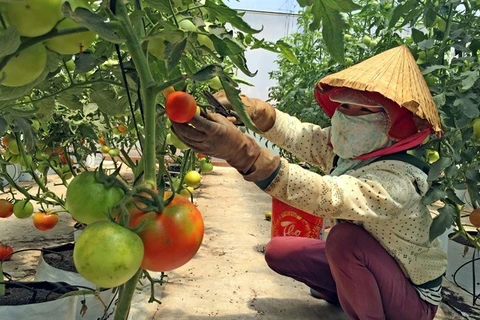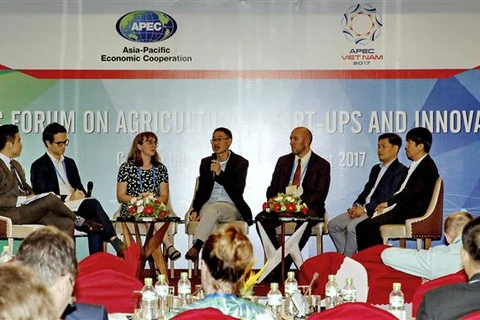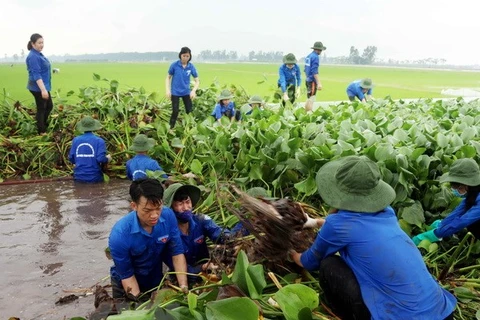 Workers of the VinEco Agricultural Production Investment Development Co., Ltd. harvest safe vegetable sprouts at the company's VinEco Tam Dao Farm in northern Vinh Phuc province (Photo: VNA)
Workers of the VinEco Agricultural Production Investment Development Co., Ltd. harvest safe vegetable sprouts at the company's VinEco Tam Dao Farm in northern Vinh Phuc province (Photo: VNA) HCM City (VNS/VNA) - Agricultural start-ups should capitalise on the huge demand for safe agricultural products by developing long-term, sustainable production strategies, experts said at a seminar in Ho Chi Minh City on June 6.
Prof. Phan Van Truong, head of the Vietnamese Agricultural Start-up Club, said that although Vietnam’s agricultural sector was growing fast, farmers remained concerned about sales and revenues.
The country has diverse agricultural products, but does not have a consumer market based on actual supply and demand, he said, adding that farmers sometimes lowered prices to sell their products and compete with rivals.
“It’s difficult to build a brand for Vietnamese agricultural products because of low economic value,” he said.
The number of start-ups in the agricultural sector remains low because farmers are not aware of the start-up ecosystem and quality standards for agricultural products, he said.
Dr. Duong Hoai Giang Ha, Director of the InterEducation Vietnam Institute, said the country’s agricultural products were not properly priced.
“Farmers only pay attention to producing raw agricultural products instead of creating added value for the products,” he said.
Most of the farming start-ups do not share information and business opportunities with each other, making it difficult to build agricultural markets.
Seb Tran, a marketing expert, and CMO and founder of Shi Marcoms Ltd Co, said that most Vietnamese start-ups had not clearly defined their objectives for each development stage of their business.
Most start-ups want to quickly sell products to recover capital and are not patient enough to build marketing and branding strategies for the products, he said.
Le Trong Kha, Director of Lekha Mart, said that even though the Agricultural Start-up Club has 73,000 members, most of them do not work closely with one another.
To be successful, agricultural start-ups must build a long-term business strategy and strengthen linkages in a start-up ecosystem.
Developing safe agriculture can help the sector grow in a more sustainable manner, experts said at the seminar.
Vietnam is now formulating norms for food safety and environmental hygiene, which will form the groundwork toward sustainable development.
Andy Nhan Huynh, a business training specialist, said that high-quality agricultural products are in high demand, so the agriculture sector is a promising sector for investors.
Some companies that had previously invested only in real estate and trade, for example, became successful after pouring money into agricultural and food products.
Their success, however, depended on strong financial resources, and their branding and distribution systems.
Many agricultural start-ups are households or individuals who do not have enough resources to develop.
Because of their limitations, these start-ups should be connected to an ecosystem where they can exploit the strengths of other firms, he said.
Bui Hong Quan, Director of the Southern Institute of Biotechnology, said that only a few start-ups had been successful in the safe food sector.
He said that start-ups need to invest for the long term and should not expect profits immediately like other commercial activities or services.
A programme was launched the same day by The Saigon Times Startup Club to help connect small agricultural start-ups with similar models and ideas.
The programme’s advisory board consists of entrepreneurs with real-life experience in starting a business. They will provide advice on how to optimise resources, minimise risks and save costs, and will also offer training.
HCM City has set the goal of having 500,000 firms by 2020, with at least 1,500 of them operating in agriculture, under the Government’s Resolution No.35 on developing enterprises.
In recent years, more than 300 agricultural firms have been established, bringing the total to more than 1,300 in the city.
The city offers preferential loans to these firms and promotes the establishment of agricultural cooperatives.
In addition, zero-interest loans are being offered to high-tech agricultural projects, under the city's agricultural restructuring plan for 2017-2020.
Vietnam is currently ranked second in Southeast Asia and 13th in the world in agricultural production, according to the Ministry of Agriculture and Rural Development.
The meeting, organised by Saigon Times newspaper, was held to encourage young agricultural firms and start-ups to create clean, safe farms and agricultural products by using advanced technology.-VNS/VNA
VNA






















